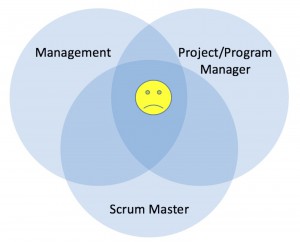Introduction
Wow! The lesson I have learned is not to read literature any more. A literature search on “Management, Project Management, and Scrum Master Roles” will make you dizzy, nauseous, and state every possible opinion as the correct one!
The bottom line is that the word “manage” has been around for hundreds of years. When it is not done, either the wrong people have been assigned, the managers or Scrum Masters don’t currently have the skills to “manage,” or they are avoiding the accountability that comes with the role. Don’t worry, all these issues are fixable.
If your organization has deadline problems, budget problems, or chaos, then at least a few critical “management” tasks are not getting done. If you are debating endlessly within your group about “The traditional project manager vs. the transformational coach,” or, “project manager vs. Scrum Master,” or “coordinator vs. manager,” then you might be asking the wrong questions. That is, who really cares what someone is called? Instead, let us focus on the results you want.
Where to start?
Start with the end result you actually want and then work backwards. Identify the necessary tasks to perform and a person who can perform them. Then, if you want a sexy, cool name, assign one.
To proceed, answer the following questions:
1. What result do you want?
Examples include: a) meet deadlines, b) meet budget, c) meet quality expectations, d) great teamwork, e) address avoidable risk, d) manage resource pool, e) address long-term company survival, f) resolve conflicts with staff, customers and suppliers.
2. What tasks need to be performed to achieve the selected goals (see the example list below)?
3. Who is best qualified (or could learn) and would excel and enjoy the tasks?
4. Optional: give them a cool title.
From these steps, you will end up with stuff to do, and people to do stuff. The purpose is to get the results you want, not to debate industry role definitions that might have little or no meaning in your organization.
Below is an example list of tasks that are typical to choose from. Add your own tasks based upon the goals and complexities of your group.
Tasks that someone probably needs to do
- Establish long-term, clearly defined goals, and communicate them to the organization (e.g., sales, deadlines, profit, budget, and quality).
- Set short- and medium-term goals for each project team.
- Build achievable deadlines and options.
- Review the soundness of project data (e.g., estimates, risks, schedule).
- Negotiate deadline options with management, marketing, and customers.
- Manage several related projects focused on one primary goal.
- Assess, prioritize and mitigate risks.
- Communicate progress, issues and risks to all stakeholders periodically.
- Identify and track project and resource dependencies with other teams, customers, and suppliers.
- Address and resolve sticky project issues early.
- Address and manage scope, deadline, and other project changes.
- Facilitate project teamwork activities (e.g., planning, scoping, estimation, demos).
- Address and resolve teamwork challenges.
- Address and resolve organizational people, customer, and supplier challenges.
- Verify that expected practices (e.g., estimation, risk, planning, scope management, and testing) are being performed.
- Maintain high standards.
- Resolve priority conflicts that are impacting achievable schedules.
- Assign resources so that deadlines are achievable or initiate a re-plan to account for resource changes.
- Manage the resource pool to know who is free and who is occupied.
- Write code. Just kidding! Don’t select this item. If you do, that means you are hoping to be distracted away from the other items. If managers are coding, and they have a team of more than four or five people, something else is probably not getting done.
If you don’t want to do the items on the list, or management doesn’t really care, then conclude that status quo is acceptable. If you currently have three people all doing the same job on a project (e.g., project leader/coordinator, project manager, Scrum Master), then stop and decide what needs be done, and who can do it. Having three people each pretend that they are all doing something different is expensive.
If you would like help to resolve your role issues quickly, contact us for a complimentary 45-minute chat, or just send an email.
See our upcoming webinar events. They might be just what you need.
[Forward this email to your boss! Subject: Here’s a cool tip for you] Quick Link
 The Process Group helps you improve your organization's capability to routinely meet deadlines and delivery quality expectations. We are certified CMMI appraisers / trainers and Certified Scrum Masters.
The Process Group helps you improve your organization's capability to routinely meet deadlines and delivery quality expectations. We are certified CMMI appraisers / trainers and Certified Scrum Masters. 